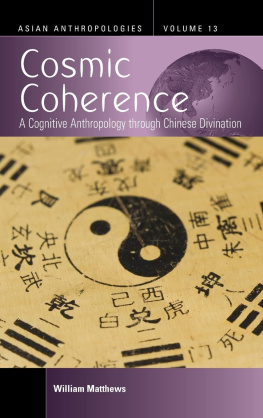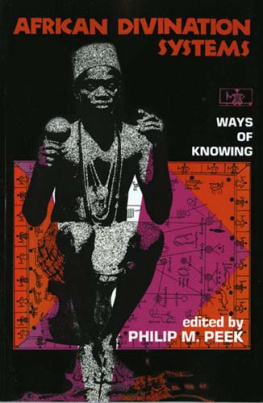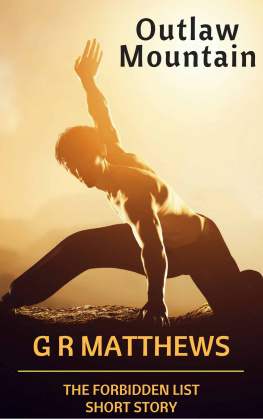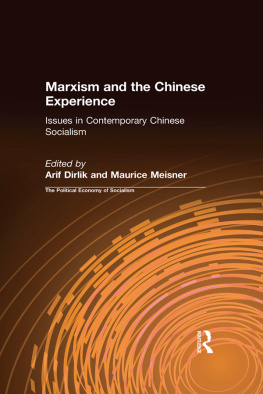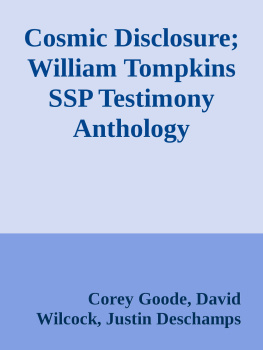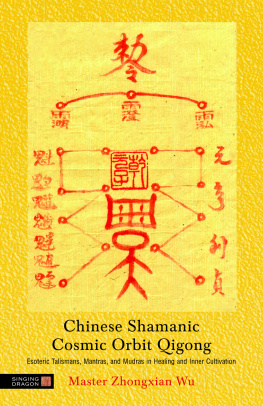William Matthews - Cosmic Coherence: A Cognitive Anthropology Through Chinese Divination
Here you can read online William Matthews - Cosmic Coherence: A Cognitive Anthropology Through Chinese Divination full text of the book (entire story) in english for free. Download pdf and epub, get meaning, cover and reviews about this ebook. year: 2021, publisher: Berghahn Books, genre: Romance novel. Description of the work, (preface) as well as reviews are available. Best literature library LitArk.com created for fans of good reading and offers a wide selection of genres:
Romance novel
Science fiction
Adventure
Detective
Science
History
Home and family
Prose
Art
Politics
Computer
Non-fiction
Religion
Business
Children
Humor
Choose a favorite category and find really read worthwhile books. Enjoy immersion in the world of imagination, feel the emotions of the characters or learn something new for yourself, make an fascinating discovery.
- Book:Cosmic Coherence: A Cognitive Anthropology Through Chinese Divination
- Author:
- Publisher:Berghahn Books
- Genre:
- Year:2021
- Rating:5 / 5
- Favourites:Add to favourites
- Your mark:
- 100
- 1
- 2
- 3
- 4
- 5
Cosmic Coherence: A Cognitive Anthropology Through Chinese Divination: summary, description and annotation
We offer to read an annotation, description, summary or preface (depends on what the author of the book "Cosmic Coherence: A Cognitive Anthropology Through Chinese Divination" wrote himself). If you haven't found the necessary information about the book — write in the comments, we will try to find it.
William Matthews: author's other books
Who wrote Cosmic Coherence: A Cognitive Anthropology Through Chinese Divination? Find out the surname, the name of the author of the book and a list of all author's works by series.
Cosmic Coherence: A Cognitive Anthropology Through Chinese Divination — read online for free the complete book (whole text) full work
Below is the text of the book, divided by pages. System saving the place of the last page read, allows you to conveniently read the book "Cosmic Coherence: A Cognitive Anthropology Through Chinese Divination" online for free, without having to search again every time where you left off. Put a bookmark, and you can go to the page where you finished reading at any time.
Font size:
Interval:
Bookmark:
Asian Anthropologies
General Editors:
Hans Steinmller, London School of Economics
Dolores Martinez, SOAS, University of London
Founding Editors:
Shinji Yamashita, The University of Tokyo
Jerry Eades, Emeritus Professor, Ritsumeikan Asia Pacific University
Recent volumes:
Volume 13
Cosmic Coherence: A Cognitive Anthropology through Chinese Divination
William Matthews
Volume 12
Stories from an Ancient Land: Perspectives on Wa History and Culture
Magnus Fiskesj
Volume 11
Aspirations of Young Adults in Urban Asia: Values, Family and Identity
Edited by Mariske Westendorp, Dsire Remmert and Kenneth Finis
Volume 10
Tides of Empire: Religion, Development, and Environment in Cambodia
Courtney Work
Volume 9
Fate Calculation Experts: Diviners Seeking Legitimation in Contemporary China
Geng Li
Volume 8
Soup, Love, and a Helping Hand: Social Relations and Support in Guangzhou, China
Friederike Fleischer
Volume 7
Ogata-Mura: Sowing Dissent and Reclaiming Identity in a Japanese Farming Village
Donald C. Wood
Volume 6
Multiculturalism in the New Japan: Crossing the Boundaries Within
Edited by Nelson Graburn, John Ertl and R. Kenji Tierney
Volume 5
Engaging the Spirit World: Popular Beliefs and Practices in Modern Southeast Asia
Edited by Kirsten W. Endres and Andrea Lauser
Volume 4
Centering the Margin: Agency and Narrative in Southeast Asian Borderlands
Edited by Alexander Horstmann and Reed L. Wadley
For a full volume listing, please see the series page on our website:
https://www.berghahnbooks.com/series/asian-anthropologies
COSMIC COHERENCE
A Cognitive Anthropology through Chinese Divination

William Matthews

First published in 2022 by
Berghahn Books
www.berghahnbooks.com
2022 William Matthews
All rights reserved. Except for the quotation of short passages for the purposes of criticism and review, no part of this book may be reproduced in any form or by any means, electronic or mechanical, including photocopying, recording, or any information storage and retrieval system now known or to be invented, without written permission of the publisher.
Library of Congress Cataloging-in-Publication Data
Names: Matthews, William, 1988- author.
Title: Cosmic coherence : a cognitive anthropology through Chinese divination / William Matthews.
Description: First edition. | New York : Berghahn, 2022. | Series: Asian anthropologies ; volume 13 | Includes bibliographical references and index.
Identifiers: LCCN 2021028786 (print) | LCCN 2021028787 (ebook) | ISBN 9781800732681 (hardback) | ISBN 9781800732698 (ebook)
Subjects: LCSH: Cosmology, Chinese. | DivinationChinaHistory. | Yi jing. | Cognition and cultureChinaHistory.
Classification: LCC B127.C68 M38 2022 (print) | LCC B127.C68 (ebook) | DDC 113dc23
LC record available at https://lccn.loc.gov/2021028786
LC ebook record available at https://lccn.loc.gov/2021028787
British Library Cataloguing in Publication Data
A catalogue record for this book is available from the British Library
ISBN 978-1-80073-268-1 hardback
ISBN 978-1-80073-269-8 ebook
This book is dedicated to the memory of Master Tao Songhe, teacher and friend, without whom it would not have been possible.


Figures
Tables

Searching for a suitable site to conduct my PhD fieldwork in summer 2013, I spent several days in the Hunanese capital, Changsha. My original proposal had been to investigate the relationship between cosmological ideas and practices of nourishing life (yangsheng) in the context of a reviving teahouse culture. But this changed when my partner and I went to visit one of Changshas main temples, and impulsively decided to consult one of the diviners operating in the street nearby.
Prior to this, I had not given Chinese divination much thought, though I was vaguely aware of the eight characters (bazi), referring to the year, month, date and two-hour period of ones birth, which could be used to derive a broad picture of ones fate. And having studied Chinese history and culture over several years, I was aware of the Yijing and its significance. Looking back, that day in Changsha sparked a deeper interest that would ultimately lead me to abandon my teahouse project and focus instead on cosmology and divinatory reasoning. My real interest, even with the tea project, was cosmology, and how individuals develop cosmological theories and then apply them to understand the world; divination promised a more intriguing way in.
The diviners shop was fairly small, and he sat at a desk to the right of the entrance, the wall behind him covered in cosmological charts and a list of prices. Knowing little of what to expect, I asked for the cheapest consultation, which turned out to be based on bazi. Once I had told the diviner my date of birth, he spent some time carefully annotating my bazi and drawing up a picture of my fate divided into ten-year periods, replete with cosmological terms I barely understood.
At the time, I lacked the knowledge of correlative cosmology necessary to understand much of the underlying logic of the diviners diagnosis. What he told me, though, was very positive. I would be rich and successful. Beyond that, I remember few of the specifics, save that my forecasted future financial windfalls prompted the diviner to insist I pay him several times the original consultation fee, as in time I would easily be able to afford it. Thus, in this first encounter with divination I was also exposed to one of the most common points of (contested) criticism that it attracts from non-diviners that it is fundamentally about swindling people (pianren).
Nonetheless, I was drawn in by the clear complexity and sophistication of the divination system, and in particular by its reliance on the intricate relationships between successive layers of correlated cosmological principles (this much was evident from the consultation, even if I did not understand what the principles were). This marked it out distinctly from previous encounters I had had with the mantic arts, generally in the form of newspaper horoscopes and tarot cards methods which, while clearly psychologically useful as decision-making aids, appeared to me to rely very much on reading ones own meaning into them. My curiosity was piqued further through a long conversation with a friend in Chengdu, who confirmed to me what I had already intuitively decided: that researching divination would prove considerably more interesting than researching teahouses, at least to me.
The city I eventually decided on for fieldwork, based primarily on its fame for the production, sale and consumption of longjing green tea, and not at all for its general scenic beauty, delicious cuisine and accessibility, was Hangzhou, the capital of east Chinas prosperous Zhejiang province. I returned to Hangzhou in September that same year to commence fieldwork, fully intending to turn my tea project into something much more about fate and the cosmos. I began by familiarising myself with the main Buddhist and Daoist temples in the city, though it was my flatmates offer to take me to a large but less well-known Buddhist temple by the Grand Canal that proved decisive. There, I got to know several volunteers whom I would subsequently visit most Wednesday mornings, when we would discuss fate, divination and belief, primarily from their Buddhist perspective. After one of our earlier meetings I took a walk along the canal, down a pedestrian street where I noticed a diviner sitting at the roadside.
Font size:
Interval:
Bookmark:
Similar books «Cosmic Coherence: A Cognitive Anthropology Through Chinese Divination»
Look at similar books to Cosmic Coherence: A Cognitive Anthropology Through Chinese Divination. We have selected literature similar in name and meaning in the hope of providing readers with more options to find new, interesting, not yet read works.
Discussion, reviews of the book Cosmic Coherence: A Cognitive Anthropology Through Chinese Divination and just readers' own opinions. Leave your comments, write what you think about the work, its meaning or the main characters. Specify what exactly you liked and what you didn't like, and why you think so.

